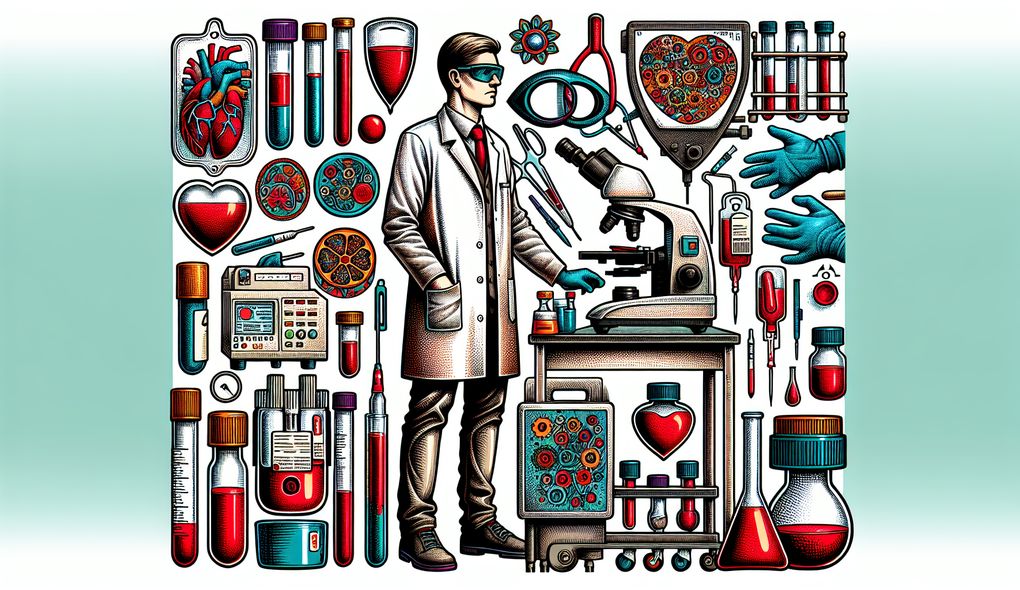How do you handle stress and maintain composure in high-pressure situations?
JUNIOR LEVEL

Sample answer to the question:
In high-pressure situations, I handle stress and maintain composure by taking a step back to assess the situation and prioritize tasks. I believe in the power of deep breathing and visualization techniques to calm myself down. Additionally, I find it helpful to break down complex tasks into smaller, more manageable steps. Communication is crucial in these situations, so I make sure to keep open lines of communication with my team and superiors to address any challenges or seek guidance. Lastly, I always remind myself to focus on the end goal and the importance of my role in providing safe and quality blood products.
Here is a more solid answer:
In high-pressure situations, I rely on a combination of strategies to handle stress and maintain composure. First, I prioritize tasks by assessing the situation and identifying the most critical and time-sensitive issues. This allows me to focus my energy and attention where it is needed most. I have found that deep breathing and visualization techniques help me stay calm and centered. By taking a few moments to breathe deeply and visualize a positive outcome, I am able to reduce anxiety and approach the situation with a clear mind. Another strategy I employ is breaking down complex tasks into smaller, more manageable steps. This helps me stay organized and prevents me from feeling overwhelmed. Communication is also key in high-pressure situations. I make sure to maintain open lines of communication with my team and superiors, keeping them informed about progress, challenges, and any additional support I may need. Lastly, I always remind myself of the end goal and the importance of my role in providing safe and quality blood products to patients. This motivates me to stay focused and remain composed, even in challenging circumstances.
Why is this a more solid answer?
The solid answer expands on the basic answer by providing more specific strategies and examples. It addresses all the evaluation areas mentioned in the job description by highlighting the candidate's ability to work effectively under pressure, attention to detail, and interpersonal and communication skills. However, it can be further improved by including some concrete examples or anecdotes that demonstrate how the candidate has successfully applied these strategies in past high-pressure situations.
An example of a exceptional answer:
In my experience, handling stress and maintaining composure in high-pressure situations requires a multifaceted approach. One strategy I employ is proactive planning. By anticipating potential stressors and developing contingency plans, I am able to minimize the impact of unexpected events and maintain composure. For example, in my previous role as a Blood Banking/Transfusion Medicine Specialist, I created a comprehensive emergency response plan that outlined the steps to be taken in the event of a blood shortage or a sudden increase in demand. This plan allowed my team to respond quickly and effectively, ensuring a seamless supply of blood products to meet patient needs. Additionally, I have found that self-care is crucial in managing stress. I prioritize regular exercise, healthy eating, and sufficient sleep to ensure that I am physically and mentally prepared to handle high-pressure situations. Another strategy I utilize is seeking support from my colleagues and mentors. Collaborating with others and leveraging their expertise not only eases the burden but also provides valuable perspectives and solutions. Finally, I have honed my communication skills to effectively convey critical information and calmly address any challenges that arise. By remaining composed and assertive, I am able to build trust and inspire confidence in my team, ensuring that we can work together efficiently even in the most demanding situations.
Why is this an exceptional answer?
The exceptional answer goes above and beyond by providing a comprehensive and detailed approach to handling stress and maintaining composure in high-pressure situations. It includes specific examples from the candidate's past experience, such as creating an emergency response plan in a previous role. The answer addresses all the evaluation areas mentioned in the job description by showcasing the candidate's ability to work effectively under pressure, attention to detail, and strong interpersonal and communication skills. It also demonstrates the candidate's proactive and strategic thinking, as well as their commitment to self-care and seeking support from others. This answer provides a well-rounded and impressive response to the question.
How to prepare for this question:
- Reflect on past experiences where you have faced high-pressure situations and how you managed to maintain composure.
- Research and practice stress management techniques, such as deep breathing, visualization, and mindfulness.
- Develop a thorough understanding of the job responsibilities and how they might contribute to high-pressure situations.
- Consider seeking support from mentors or colleagues who have experience in handling stress in similar roles.
- Prepare specific examples or anecdotes that demonstrate your ability to handle stress and maintain composure in past professional experiences.
What are interviewers evaluating with this question?
- Ability to work effectively under pressure in a fast-paced environment
- Strong attention to detail and meticulous work habits
- Strong interpersonal and communication skills

